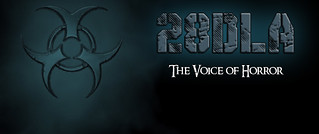Director/writer: Till Kleinert.
Cast: Michel Diercks, Pit Bukowski.
Der Samurai is, essentially, Till Kleinert's bizarre, gruesome take on “Little Red Riding Hood,” mixed with the typical 'making of a samurai' story. Kleinert's picture brings something strange and ferocious to a fairy tale that is often lacklustre in its re-telling. The samurai component may not appease samurai cinema enthusiasts, however heads do roll, and the combination of the two story lines surprisingly works well together in this twisted, Lynchian nightmare. Although some of the concepts are over done, the acting is convincing and the cinematography is brilliant. This film is definitely worth watching for lovers of creepy, arthouse cinema, but steer clear if you're after a blockbuster slasher flick.
The film follows Jakob (Michel Diercks), a small town police officer, as he attempts to catch a wolf on the loose. Jacob struggles to belong in a place where he's doomed to remain a loser; the locals don't respect his authority and bully him relentlessly. But one night, while chasing the wolf's howl, he stumbles upon something more menacing. Enter the samurai: (Pit Bukowski), a katana-wielding, cross-dressing Joker-esque weirdo, who takes Jakob on a crazed, bloody adventure, unleashing a side of Jakob once hidden. The samurai playfully wreaks havoc, laughing while slicing his way through town. Although his quirky brutality makes for a good contrast with Jakob's timid, “good cop” persona, the two are also similar; they're both loners who don't belong.
Together, these two doppelgangers embark on a violent dance, with each taking turns as the lead. The samurai savagely destroys the locals who've been tormenting Jakob, and invites him join in, but Jakob is torn between his duty to serve and protect and his bottled up anger and resentment toward the villagers who have made his life hell.
The fact that the samurai happens to be a man in a dress plays into Jakob's uncertainty about his sexuality, but it's never quite clear what Kleinert's vision is in regard to the transvestite villain. Is he trying to push the envelope by incorporating gender-bending sexuality, mixed with brutal violence, or commenting on German culture and certain views of homosexuality or women? Whatever the reason, sexuality does run rampant in Der Samurai. References to Jakob's pistol are fairly presumptuous, as is the film's main phallic symbol, the sword. However obvious, the phallic imagery is effective, specifically in creating anxiety in Jakob's character.
Overall, the themes in the story work, but some are not executed as well as others, and could have been drawn out given the film's short length. While the idea of humans as bottles—our heads, the corks—is at first intriguing, it's slightly overdone and fairly laughable. See, the heads must come off in order to relieve the pressure. You get the drift. Repetition of the “lone wolf” motif is also slightly overdone, but reinforces the samurai aspect and describes both characters perfectly. The Red Riding Hood facet is obvious, but well done: we have a wolf, the woods, grandma, and even a red cloak (Jakob's red hair) but in this version, the woods are not deep, dark, or even scary. The story takes place in Little Red's home town—everything's familiar. At one point, we discover that Jakob has built his own little town—a miniature model—that resembles where he lives. The samurai sets fire to the tiny village, which clearly symbolizes the fact that Jakob needs to get out, and also that this stranger is tearing his world apart. This idea could have been pushed a bit further. The story's real strength lies in the conflict and intimacy between the two main characters, the actors' performances, and the visuals.
Aesthetically, the film is stunning. Kleinert successfully creates a nightmarish backdrop for his uniquely disturbing story, complete with fountains of blood reminiscent of any good slasher and samurai film. Der Samurai seems like a movie from the world of David Lynch; the attention to colour contrast and overdramatic, dreamlike sequences add to the bizarre atmosphere. The loose ends are also quite Lynchian in the sense that you don't know the characters' origins all that well, and you really don't need to. The focus is primarily on the present action, which makes the pacing of this film on point.
Although Der Samurai has many violent, gory scenes, it shouldn’t be deemed a horror film; it lacks scare factor, and is far more artsy than suspenseful. Having said that, there certainly is a creepy, unsettling element to this film that may draw in a crowd of horror hounds. Despite its title, this film is not for those who live and die by the samurai sword, as it's a bit too quirky and dreamlike, though the copious amounts of blood are sure to please. If you are a fan of bizarre, David Lynch-type films and strikingly weird villains, you may well enjoy this film. All in all, it is successful as a strange, atmospheric, gory art film, that delivers a lively story with gripping characters and solid performances.
Overall, this film warrants a 7.5 out of 10.
-by Kenna Rae-
Readers can visit Kenna's own site, here:
Hey Kenna Rae
Subscribe to 28 Days Later: An Analysis Email Subscription
Cast: Michel Diercks, Pit Bukowski.
Der Samurai is, essentially, Till Kleinert's bizarre, gruesome take on “Little Red Riding Hood,” mixed with the typical 'making of a samurai' story. Kleinert's picture brings something strange and ferocious to a fairy tale that is often lacklustre in its re-telling. The samurai component may not appease samurai cinema enthusiasts, however heads do roll, and the combination of the two story lines surprisingly works well together in this twisted, Lynchian nightmare. Although some of the concepts are over done, the acting is convincing and the cinematography is brilliant. This film is definitely worth watching for lovers of creepy, arthouse cinema, but steer clear if you're after a blockbuster slasher flick.
The film follows Jakob (Michel Diercks), a small town police officer, as he attempts to catch a wolf on the loose. Jacob struggles to belong in a place where he's doomed to remain a loser; the locals don't respect his authority and bully him relentlessly. But one night, while chasing the wolf's howl, he stumbles upon something more menacing. Enter the samurai: (Pit Bukowski), a katana-wielding, cross-dressing Joker-esque weirdo, who takes Jakob on a crazed, bloody adventure, unleashing a side of Jakob once hidden. The samurai playfully wreaks havoc, laughing while slicing his way through town. Although his quirky brutality makes for a good contrast with Jakob's timid, “good cop” persona, the two are also similar; they're both loners who don't belong.
Together, these two doppelgangers embark on a violent dance, with each taking turns as the lead. The samurai savagely destroys the locals who've been tormenting Jakob, and invites him join in, but Jakob is torn between his duty to serve and protect and his bottled up anger and resentment toward the villagers who have made his life hell.
The fact that the samurai happens to be a man in a dress plays into Jakob's uncertainty about his sexuality, but it's never quite clear what Kleinert's vision is in regard to the transvestite villain. Is he trying to push the envelope by incorporating gender-bending sexuality, mixed with brutal violence, or commenting on German culture and certain views of homosexuality or women? Whatever the reason, sexuality does run rampant in Der Samurai. References to Jakob's pistol are fairly presumptuous, as is the film's main phallic symbol, the sword. However obvious, the phallic imagery is effective, specifically in creating anxiety in Jakob's character.
Overall, the themes in the story work, but some are not executed as well as others, and could have been drawn out given the film's short length. While the idea of humans as bottles—our heads, the corks—is at first intriguing, it's slightly overdone and fairly laughable. See, the heads must come off in order to relieve the pressure. You get the drift. Repetition of the “lone wolf” motif is also slightly overdone, but reinforces the samurai aspect and describes both characters perfectly. The Red Riding Hood facet is obvious, but well done: we have a wolf, the woods, grandma, and even a red cloak (Jakob's red hair) but in this version, the woods are not deep, dark, or even scary. The story takes place in Little Red's home town—everything's familiar. At one point, we discover that Jakob has built his own little town—a miniature model—that resembles where he lives. The samurai sets fire to the tiny village, which clearly symbolizes the fact that Jakob needs to get out, and also that this stranger is tearing his world apart. This idea could have been pushed a bit further. The story's real strength lies in the conflict and intimacy between the two main characters, the actors' performances, and the visuals.
Aesthetically, the film is stunning. Kleinert successfully creates a nightmarish backdrop for his uniquely disturbing story, complete with fountains of blood reminiscent of any good slasher and samurai film. Der Samurai seems like a movie from the world of David Lynch; the attention to colour contrast and overdramatic, dreamlike sequences add to the bizarre atmosphere. The loose ends are also quite Lynchian in the sense that you don't know the characters' origins all that well, and you really don't need to. The focus is primarily on the present action, which makes the pacing of this film on point.
Although Der Samurai has many violent, gory scenes, it shouldn’t be deemed a horror film; it lacks scare factor, and is far more artsy than suspenseful. Having said that, there certainly is a creepy, unsettling element to this film that may draw in a crowd of horror hounds. Despite its title, this film is not for those who live and die by the samurai sword, as it's a bit too quirky and dreamlike, though the copious amounts of blood are sure to please. If you are a fan of bizarre, David Lynch-type films and strikingly weird villains, you may well enjoy this film. All in all, it is successful as a strange, atmospheric, gory art film, that delivers a lively story with gripping characters and solid performances.
Overall, this film warrants a 7.5 out of 10.
-by Kenna Rae-
Readers can visit Kenna's own site, here:
Hey Kenna Rae
Subscribe to 28 Days Later: An Analysis Email Subscription


 Saturday, May 02, 2015
Saturday, May 02, 2015
 Kenna Rae
Kenna Rae




 Posted in:
Posted in: 


0 comments:
Post a Comment